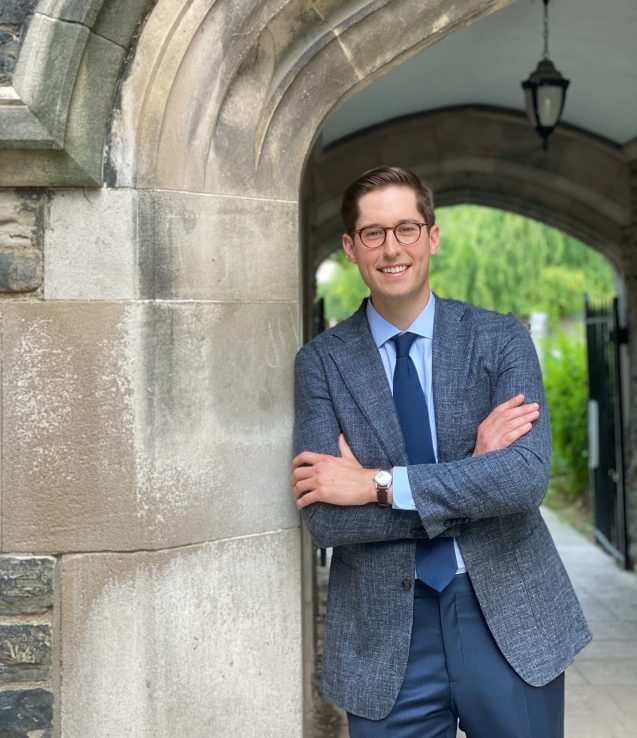
By Alisa Kim
In the early days of the COVID-19 pandemic, confusion and anxiety were palpable. Media coverage of the unfolding crisis was non-stop, and new information—sometimes conflicting—emerged hour to hour.
Supermarkets could not restock their shelves fast enough. People began hoarding toilet paper and other supplies. As Canada went into lockdown, the sense of fear was unlike any we had felt before. Against this backdrop, senior leaders at TELUS Corporation sought expert guidance to ensure that its 60,000-plus workforce and the communities it served weathered the storm safely.
Executives at TELUS tapped Dr. Dominik Nowak, a family physician and alumnus of the Institute of Health Policy, Management and Evaluation (IHPME), to chair its medical advisory council as part of its pandemic response. Nowak, who graduated from the masters in health administration program, drew upon something he learned as an IHPME student.
“In our health strategy course with Dean Steini Brown, he said, ‘When you finish this program, you’ll be asked to do a job. Oftentimes that job will be very difficult and involve a lot of complexity. It will be very hard for one person to do alone. When you recognize that, always ask for a team.’ That was a learning point: as soon as I got the ask, I said, ‘We need a team for this,’” says Nowak.
He marshaled a group of experts across Canada in the areas of health policy, public health, infectious diseases, occupational health and mental health. The council advises the company on how to keep its staff and customers safe, planning for the future, and being a responsible corporate citizen.
“Because the questions are so nuanced, we decided that one set of expertise was not enough; you really need that interdisciplinary lens because everything touched on health regardless of which policy you thought of,” says Nowak, who is the council’s physician lead.
Dr. Allan Detsky, a professor at IHPME and the former Physician-in-Chief at Mount Sinai Hospital in Toronto, Canada, is the council’s health policy and economics lead. “When Dominik told me he was going to chair [the council], I knew he was taking on a huge task. I was happy to support him in this endeavour and have enjoyed working with him, the rest of the medical advisory council, as well as the people who work at TELUS and affiliated companies. We have all learned a lot, and I know we have helped many Canadians figure out how to work and live through this difficult time,” says Detsky.
Early on in the pandemic, the council advised that employees work from home — 75 per cent of the workforce already did, at least part-time, thanks to the company’s Workstyles program, but this number quickly grew to 95 per cent working remotely full-time. It recommended the use of masks long before Canada’s public health leaders advised mask-wearing. It developed a “playbook”—a step-by-step guide for what to do when a staff member gets sick at work, needs medical assessment or requests information about the novel coronavirus. The playbook has been shared with more than half a million people, including customers and partner organizations of TELUS. “The pandemic playbook gave leaders confidence that what they were doing in response to questions around COVID-19 were the right things—from a public health perspective. They were based on science, rather than fear,” says Nowak.
The council also supported community outreach efforts like the TELUS Mobility for Good program, which donated more than 14,000 devices and data plans totalling $8.75 million to help isolated older adults, hospitalized patients and at-risk Canadians stay connected during the COVID-19 pandemic. For many Toronto hospitals, this initiative allowed people who were hospitalized and alone due to COVID-19 to stay in touch with their loved ones.
In the initial crisis response, the council met nearly every day; as things have settled down, it meets a few times per week. Looking ahead, it is also discussing flu vaccines and developing a strategy around that for the organization.
Nowak says that there are striking similarities between his work with TELUS and his clinical practice in that both roles require him to be a trusted advisor and to communicate well. In reflecting on the impact of the council he says, “I think what we did at TELUS is really special and forward thinking in that every single policy touches on health in an industry that is not traditionally health care-oriented. Usually my reach is one-on-one as a clinician. It’s been such a privilege to work more broadly on a population level for an organization committed to Canadians in the public health response.”
Related News

Sign up for IHPME Connect.
Keep up to date with IHPME’s News & Research, Events & Program, Recognition, e-newsletter.
Subscribe to Connect Newsletter
Get in Contact
Communications
Marielle Boutin
Email Address: ihpme.communications@utoronto.ca





